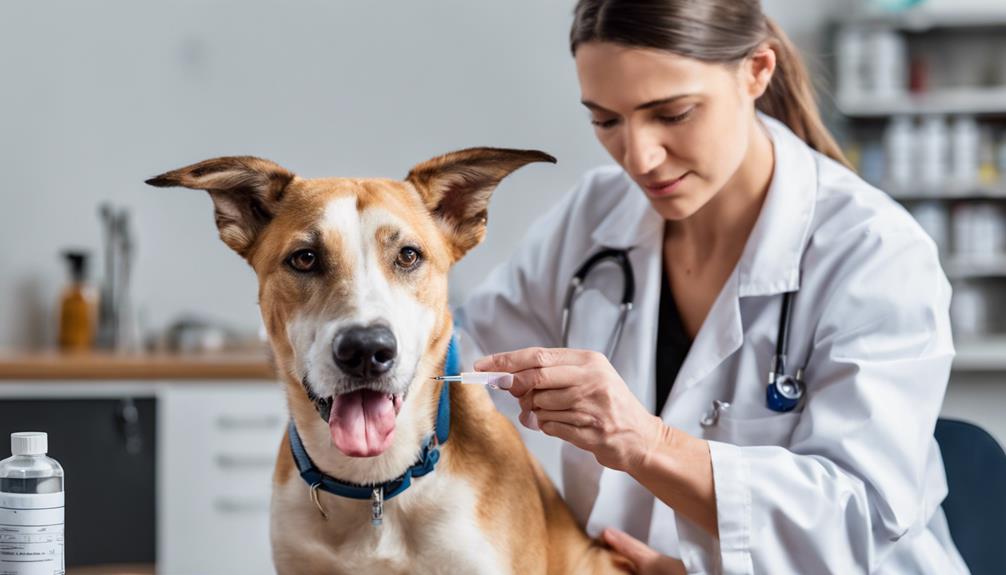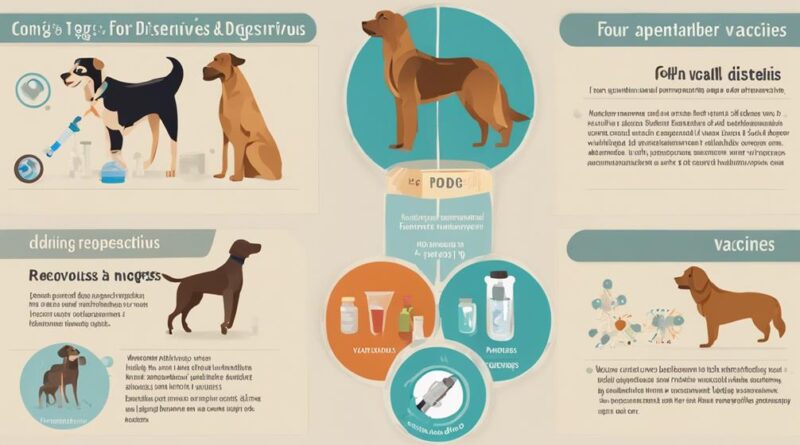Four Essential Vaccines Every Dog Needs
Ensure your dog's health with these four essential vaccines: Canine Distemper, Rabies, Parvovirus, and Adenovirus. Canine Distemper vaccine prevents a fatal disease and boosts the immune system. Rabies vaccine protects against a deadly virus and is often a legal requirement. Parvovirus vaccine is crucial, especially for puppies, and provides proven protection. Adenovirus vaccine prevents severe illness and contagion. Keeping your dog up to date with these vaccinations is vital for their well-being. Understanding the importance of each vaccine is key to safeguarding your furry friend's health and longevity. Consider learning more about these essential vaccines for your dog.
Importance of Dog Vaccinations
Ensuring your dog receives essential vaccinations is crucial in safeguarding their health and protecting them from preventable diseases. Vaccinations play a vital role in preventative health care for your furry friend by boosting their immune system protection against various infections and illnesses.
By staying up to date on vaccinations, you aren't only protecting your dog but also helping to create a safer environment for other pets in your community. Preventative health measures such as vaccinations can significantly reduce the spread of contagious diseases among dogs.
Regular vaccinations help your dog develop immunity to potentially life-threatening diseases such as rabies, parvovirus, distemper, and adenovirus. These vaccines work by stimulating your dog's immune system to produce antibodies that can fight off specific viruses or bacteria they may encounter.
Failure to vaccinate your dog leaves them vulnerable to serious health risks and can lead to unnecessary suffering. Keep in mind that some diseases, like rabies, aren't only a danger to your pet but also pose a risk to human health. By prioritizing your dog's vaccinations, you're taking an important step towards ensuring their long-term well-being and happiness.
Understanding Core Vaccines for Dogs
To properly protect your dog's health and well-being, it's imperative to understand the core vaccines recommended for dogs. Core vaccines are essential immunizations that all dogs should receive regardless of their lifestyle or environment. These vaccines protect against common and potentially deadly diseases that can affect your pet's health. Understanding the benefits of core vaccines is crucial for maintaining your dog's overall well-being.
Core vaccines play a vital role in preventing serious illnesses in dogs. They help build immunity against diseases such as rabies, distemper, parvovirus, and adenovirus. By vaccinating your dog with these core vaccines, you aren't only safeguarding your pet's health but also contributing to the overall community's health by preventing the spread of contagious diseases.
The benefits of core vaccines extend beyond just protecting your dog. These vaccinations can save you from costly veterinary bills that may arise from treating preventable diseases. By investing in core vaccines, you're taking a proactive approach to ensure your pet leads a long and healthy life.
Canine Distemper Vaccine
Understanding the significance of the canine distemper vaccine is crucial for safeguarding your dog's health against this highly contagious and potentially fatal disease. Canine distemper is a serious viral infection that affects a dog's respiratory, gastrointestinal, and nervous systems. Fortunately, vaccination is highly effective in preventing this disease. The vaccine works by stimulating the immune system to produce antibodies that can fight off the virus if your dog is ever exposed to it.
Canine distemper prevention starts with following a proper vaccine schedule recommended by your veterinarian. Puppies should receive their first distemper vaccine at around 6-8 weeks of age, with booster shots every 3-4 weeks until they're about 16 weeks old. Adult dogs should receive regular booster shots to ensure continued immunity. It's important to stay up to date with vaccinations to provide ongoing protection for your furry friend.
Rabies Vaccine for Dogs
Administering the rabies vaccine to your dog is a crucial step in protecting their health and ensuring compliance with local regulations. Rabies is a deadly virus that can affect all mammals, including humans, making rabies prevention through vaccination essential. The rabies vaccine not only safeguards your dog but also helps prevent the spread of this fatal disease to other animals and people.
Following the recommended vaccine schedule for rabies is vital. Puppies usually receive their first rabies vaccine around 12-16 weeks of age, with a booster shot a year later. After this initial series, dogs typically receive a rabies vaccine every one to three years, depending on local regulations and the type of vaccine used. It's important to stay up to date with your dog's rabies vaccinations to ensure continuous protection.
Failure to vaccinate your dog against rabies can have serious consequences. In many places, it's a legal requirement to have dogs vaccinated against rabies. Authorities may impose fines or other penalties for non-compliance. Moreover, in the unfortunate event that an unvaccinated dog is exposed to rabies, the consequences can be dire, including quarantine or euthanasia.
Parvovirus Vaccine
Make sure your dog is protected against Parvovirus by getting them vaccinated as recommended by your veterinarian. Parvovirus is a highly contagious disease that affects dogs, especially puppies, and can have serious consequences for their health. Here are some key points to consider regarding the Parvovirus vaccine:
- Canine Health: Vaccinating your dog against Parvovirus is crucial for their overall health and well-being. This vaccine helps to prevent the spread of the virus and protects your furry friend from potential infection.
- Vaccine Effectiveness: The Parvovirus vaccine has been proven to be highly effective in preventing the disease. By ensuring your dog is up to date on their vaccinations, you significantly reduce their risk of contracting Parvovirus.
- Parvo Risks: Parvovirus can be particularly dangerous for puppies and unvaccinated dogs. The virus is resistant and can survive in the environment for an extended period, increasing the risk of exposure. Vaccination is key to minimizing the risks associated with Parvovirus and keeping your dog safe.
Adenovirus Vaccine
Protect your dog's health by ensuring they receive the essential Adenovirus vaccine recommended by your veterinarian. Adenovirus, a highly contagious virus that affects a dog's respiratory and gastrointestinal systems, can lead to severe illness if left untreated. The Adenovirus vaccine is crucial in preventing this disease and maintaining your furry friend's well-being.
Adenovirus prevention is key to safeguarding your dog against this potentially dangerous virus. The vaccine works by stimulating your dog's immune system to produce antibodies that will recognize and fight off the Adenovirus if they're ever exposed to it. By ensuring your dog is up to date on their Adenovirus vaccinations, you're providing them with a strong defense mechanism against this harmful virus.
The effectiveness of the Adenovirus vaccine has been well-documented in preventing the onset of Adenovirus-related illnesses. Studies have shown that vaccinated dogs have a significantly lower risk of contracting the virus compared to those who aren't vaccinated. Additionally, vaccinated dogs that do contract Adenovirus tend to experience milder symptoms and recover more quickly than unvaccinated dogs.
Parainfluenza Vaccine

Wondering how the Parainfluenza vaccine can benefit your dog's health and well-being? Parainfluenza is a highly contagious respiratory virus that can affect dogs of all ages, but is most severe in puppies and older dogs. By ensuring your dog receives the Parainfluenza vaccine as part of their vaccination schedule, you can take proactive steps in parainfluenza prevention.
Here are three key benefits of the Parainfluenza vaccine for your furry companion:
- Prevention: The vaccine helps protect your dog against parainfluenza infection, reducing the risk of them contracting this respiratory illness.
- Reduced Transmission: Vaccinated dogs are less likely to spread the virus to other dogs they come in contact with, helping to prevent outbreaks in places like dog parks, boarding facilities, and grooming salons.
- Overall Well-being: By keeping your dog up to date with their Parainfluenza vaccine, you're contributing to their overall health and quality of life, as respiratory infections can be debilitating and lead to more serious complications if left untreated.
Make sure to consult with your veterinarian to determine the appropriate vaccination schedule for your dog and ensure they're protected against parainfluenza and other preventable diseases.
Bordetella Vaccine
After addressing the importance of the Parainfluenza vaccine for your dog's respiratory health, the discussion now shifts to the Bordetella vaccine, which plays a key role in preventing another common respiratory infection in dogs. The Bordetella vaccine is crucial for kennel cough prevention and safeguarding your dog's respiratory health.
Kennel cough, also known as infectious tracheobronchitis, is a highly contagious respiratory disease commonly spread in places where dogs gather, such as boarding facilities, dog parks, and grooming salons. The Bordetella vaccine targets the bacterium Bordetella bronchiseptica, as well as other pathogens involved in kennel cough, providing protection against this bothersome illness.
Vaccinating your dog with the Bordetella vaccine is especially important if your furry friend is frequently in contact with other dogs or in environments where the risk of exposure to kennel cough is higher. By doing so, you not only protect your own dog but also contribute to the overall prevention of the disease within the dog community.
Prioritizing the Bordetella vaccine as part of your dog's vaccination schedule demonstrates your commitment to maintaining their respiratory health and well-being. Remember, prevention is key when it comes to safeguarding your canine companion from common respiratory infections like kennel cough.
Frequently Asked Questions
What Are the Potential Side Effects of Dog Vaccinations?
When it comes to dog vaccinations, it's crucial to be aware of potential side effects. Vaccine reactions and risks can vary, with common side effects including mild discomfort, lethargy, or swelling at the injection site.
To minimize these risks, it's essential to follow precautions like monitoring your dog post-vaccination and contacting your vet if you notice any concerning symptoms. Prioritizing your pet's health and well-being is key when it comes to vaccination safety.
Can a Dog Be Vaccinated if It Is Pregnant or Nursing?
If your dog is pregnant or nursing, it's generally not recommended to vaccinate her. Vaccination during this time can pose risks to the puppies and potentially have consequences for the mother.
The developing puppies could be affected by the vaccination, so it's best to wait until after the nursing period to ensure the health and safety of both the mother and her offspring.
Always consult with your veterinarian for guidance on vaccination timing.
Are There Any Alternative Vaccination Schedules Available for Dogs?
When it comes to vaccinating your dog, you might wonder about alternative options. Customized protocols and holistic approaches offer flexibility in vaccination schedules.
Some pet owners opt for homeopathic remedies to boost natural immunity instead of traditional vaccines. Consulting with a holistic veterinarian can help you explore alternatives and create a plan that aligns with your dog's specific needs.
Always prioritize your pup's health and well-being when considering different vaccination approaches.
How Long Do Dog Vaccines Provide Immunity For?
Vaccines provide immunity for varying durations depending on the specific vaccine. Each vaccine has its own effectiveness and longevity. It's crucial to follow your veterinarian's recommendations for booster shots to ensure your dog stays protected.
Regular vaccinations help maintain immunity levels and protect your furry friend from harmful diseases. Keep track of your dog's vaccination schedule to keep them healthy and happy for years to come.
Can My Dog Still Get Infected Even After Being Vaccinated?
Even though your dog has been vaccinated, there's still a small chance they can get infected. Vaccine effectiveness varies, and some dogs may not develop full immunity. Additionally, new strains of viruses can emerge that may not be covered by existing vaccines. In these cases, booster shots may be recommended.
Herd immunity can also help protect your dog from exposure to certain diseases, even if they're vaccinated.
Conclusion
In conclusion, ensuring your dog receives core vaccinations is essential for their overall health and well-being. Vaccines such as canine distemper, rabies, parvovirus, and adenovirus provide vital protection against serious diseases that can be life-threatening.
By staying up-to-date on your dog's vaccinations, you're taking proactive steps to safeguard their health and prevent the spread of infectious diseases. Remember, a healthy dog is a happy dog.
